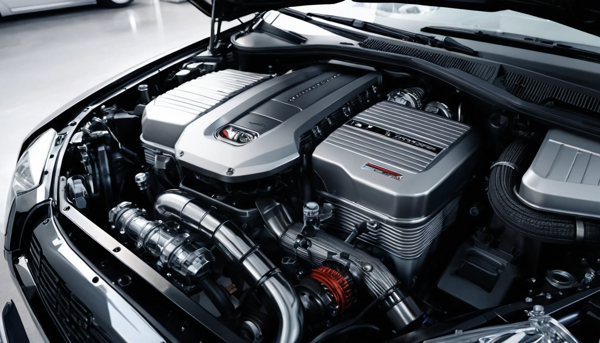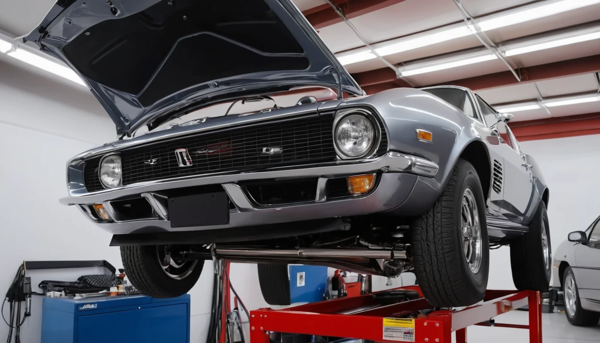How much horsepower does an ECU tune add? Discover real numbers, benefits, and why this upgrade is worth every penny.
How Much Horsepower Does an ECU Tune Add? 💥
Ever wondered what really happens under your hood when you get an ECU tune? Maybe you’ve heard stories about huge horsepower gains, better throttle response, or improved fuel efficiency—but is it all true?
Let’s get right to it: an ECU tune can add anywhere from 10 to 100+ horsepower, depending on your car’s make, model, and mods. Sounds impressive, right? But wait—there’s more to the story.
In this guide, we’re breaking it all down. Whether you’re thinking about tuning your daily driver or supercharging your weekend toy, here’s everything you need to know about how much horsepower an ECU tune can actually add.
What Is an ECU Tune, Anyways? 🧠
Your car’s Electronic Control Unit (ECU) is basically the brain of the vehicle. It controls how your engine operates—fuel delivery, ignition timing, turbo boost, and more.
An ECU tune (also known as remapping or chip tuning) modifies this software to boost performance. Think of it like reprogramming your car for speed and power instead of fuel economy and emissions.
👉 You’re not changing hardware—you’re upgrading the software.
How Much Horsepower Can You Gain From an ECU Tune? 🚀
This is the million-dollar question. And the answer isn’t one-size-fits-all—it depends on a few key factors:
| Vehicle Type | Average HP Gain | Tuning Potentia |
|---|---|---|
| Naturally Aspirated | 5–15 HP | Limited |
| Turbocharged | 30–100+ HP | High |
| Supercharged | 40–80 HP | Very High |
| Diesel Engines | 20–100 HP | Excellent |
In general:
- Stock, naturally aspirated engines get smaller gains (5–15 HP).
- Turbocharged or supercharged cars can see massive boosts (30–100+ HP).
- Diesels respond extremely well to ECU tuning.
What Affects Your Horsepower Gains? 🔧
The amount of horsepower you gain depends on:
- Engine Type – Forced induction engines (turbo/supercharged) benefit most.
- Fuel Quality – Higher octane fuel allows more aggressive tuning.
- Mods – Intake, exhaust, intercoolers, etc., multiply the effects of tuning.
- Tuner Experience – A pro-level tuner knows how to extract safe performance.
- Car Make & Model – German, Japanese, and performance cars are highly tunable.
💡 Pro Tip: Always use a reputable tuner or software to avoid damaging your engine.
Is an ECU Tune Safe? 🛑
Yes, if done right.
Tuning makes your engine work better. But a pro does it safely. You get more power without harming your engine.
⚠️ But, a bad tune can:
- Make your engine too hot
- Make your car less reliable
- Make the check engine light come on
- Void your car’s warranty
So, be smart—don’t just download a random tune off the internet.
Benefits Beyond Horsepower 🎯
You’re not just getting more power. An ECU tune also:
- Improves throttle response
- Makes turbo spool-up faster
- Increases fuel economy (yes, really!)
- Makes driving better
- Improves gear shifts (for autos)
It makes your car feel totally different.
Do You Need Other Mods for the Best Results? 🛠️
Not always—but other mods help a lot.
| Supporting Mods | Benefit With Tune |
|---|---|
| Cold Air Intake | Better airflow |
| Performance Exhaust | Improved flow |
| Intercooler Upgrade | Cooler air temps |
| High-Flow Fuel Injectors | More fuel delivery |
| Turbo Upgrade | More boost |
If you have these mods, a tune will unlock their full power. Without them, you can get good gains from just the tune.
Can You Tune a Stock Car? 🤔
Absolutely! In fact, most ECU tunes are done on stock cars.
Car makers hold back to meet emissions and fuel standards. Tuning unlocks that hidden power.
📈 It’s one of the easiest and most cost-effective ways to boost horsepower.
What’s the Cost of an ECU Tune? 💰
Prices vary, but here’s a general breakdown:
| Tune Type | Estimated Cost | Notes |
|---|---|---|
| Off-the-shelf (OTS) | $300–$700 | Pre-made, plug-and-play |
| Custom Dyno Tune | $600–$1,200+ | Tailored to your specific car |
| ECU + Tune Bundle | $800–$1,500+ | Includes hardware and software |
💸 Custom tunes cost more but deliver better, safer results.
DIY vs. Professional Tuning 🧑🔧
You can tune your car yourself with the right tools—but should you?
DIY Tuning Pros:
- Cheaper in the long run
- Learn how your engine works
- Freedom to experiment
DIY Tuning Cons:
- Risk of engine damage
- Requires learning curve
- No warranty or support
Verdict: If you’re a beginner, let a pro handle it. If you’re experienced and willing to learn, DIY is rewarding.
Does ECU Tuning Void Your Warranty? ⚠️
It can.
Most dealerships can tell if a car’s been tuned. This might void your powertrain warranty, mainly on newer cars.
But, many performance shops offer:
- Tuning that’s hard to detect
- “Warranty-safe” modes
- ECU clones to keep the original map
👀 Always check with your manufacturer before tuning a car under warranty.
How Long Does an ECU Tune Take? ⏱️
- Off-the-shelf tunes: 15–30 minutes
- Custom dyno tunes: 2–4 hours or more
- Remote tuning: A few hours via email or online software
It’s one of the fastest upgrades for big results.
Will a Tune Affect Fuel Economy? ⛽
Surprisingly, it might improve your MPG—if you drive conservatively.
Tuned cars often become more efficient at cruising speeds. But if you’re flooring it to feel the power gains… well, expect to visit the pump more often 😅
How Often Should You Tune Your ECU? 🔁
Most people tune once and leave it. But you should consider a re-tune if:
- You add new performance parts
- You switch fuel types (e.g., from 91 to E85)
- You move to a different elevation
- Your car starts running poorly
Consistency = performance + reliability.
Can ECU Tunes Be Removed? 🧽
Yes. Most tunes are reversible.
If you ever need to:
- Trade in your car
- Pass emissions
- Visit the dealership
You can revert to the stock map—either by yourself (with tuning software) or through your tuner.
Should You Tune Your Daily Driver? 🚗
Absolutely—if you do it responsibly.
Benefits for your daily car:
- Smoother drive
- Better acceleration
- Improved responsiveness
Just be cautious with aggressive race tunes on daily drivers. Choose a balance between performance and longevity.
Conclusion: Is an ECU Tune Worth It? ✅
If you want more horsepower, better throttle response, and a more exciting drive, then yes—ECU tuning is totally worth it.
Here’s the breakdown:
- HP Gains: 10–100+ depending on setup
- Cost: Starts around $300
- Time Required: 15 minutes to a few hours
- Risk: Low if done by a professional
Think of it as waking up your engine’s true personality. 🎉
If you’re on the fence, start with an off-the-shelf tune—you’ll feel the difference the moment you hit the gas.
FAQs
How much HP does an ECU tune add to a turbo car?
Turbo cars can gain between 30–100+ HP with a proper ECU tune, depending on boost and fuel quality.
Can I tune my car without adding other mods?
Yes, stock cars benefit from ECU tunes by unlocking hidden power left by the manufacturer.
Does ECU tuning damage your engine long term?
No, not if it’s professionally done. Unsafe tunes or aggressive DIY setups can cause damage.
Is a tune worth it for a naturally aspirated engine?
While the gains are modest (5–15 HP), tuning can improve throttle response and driveability.
Can I pass emissions after an ECU tune?
Some tunes disable emissions systems, so check local laws and choose a tune designed to remain emissions compliant.
References
https://www.haltech.com/what-is-ecu-tuning
https://cobbtuning.com/what-is-an-ecu-tune
https://www.motortrend.com/how-to/ecu-tuning-explained



